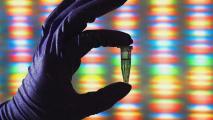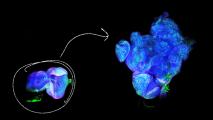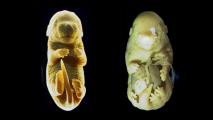Genetically modified crops have a bad rep. How could something so unnatural be good for us?
Well, we finally get to hear from the plants themselves. New evidence shows that plants have been genetically modifying themselves — and the process, called lateral gene transfer, could lead to new plants that are resilient to climate change.
The research: We all know that genes are transferred from parent to offspring. The same is true for all species, including plants. Some bacteria can swap genes with each other, but more complex life (usually) stays in its lane.
But scientists from the University of Sheffield in the U.K. found that plants can transfer genetic material between species outside of the typical evolutionary pathways. They detected foreign DNA in various grasses, including wheat, maize, barley, and rice. These plants broke the rules of genetic transfer and stole genes from their neighbors.
“By using genetic detective work to trace the origin of each gene, we found over 100 examples where the gene had a significantly different history to the species it was found in,” Luke Dunning, an author on the study, told GEN, describing a process known as lateral gene transfer (LGT).
What is lateral gene transfer?: Lateral gene transfer often refers to the transfer of genetic material between organisms of different species — without having a parent/offspring relationship.
It differs from vertical gene transfer, which is more common and more understood. Vertical gene transfer happens when an organism gets its genetic material from an ancestor — like how humans get their eye color or height from their parents’ genetic material.
What this means for the plants: The stolen genes can give the grasses, which make up most of the world’s food supply, an evolutionary advantage by allowing them to develop faster, become hardier, and adapt to new conditions quickly.
“Whilst only a relatively small proportion of genes are transferred between species, this process potentially allows grasses to cherry pick information from other species,” said Dunning.
The process could give the plants an advantage when it comes to climate change. And the study, published in the journal New Phytologist, could provide insight into developing crops that might help tackle possible food shortages.
A new perspective: Nearly nine out of 10 scientists say that GM foods are safe to eat. Despite this scientific consensus, there is still widespread skepticism about the safety of GM foods. But Dunning says that the findings could give the public a new perspective on GM plants.
“The findings may make us as a society reconsider how we view GM technology, as grasses have naturally exploited a very similar process. If we can determine how this process is happening it may allow us to naturally modify crops and make them more resistant to climate change,” Dunning said in a statement.
Next steps: Even though the team detected lateral gene transfer, they still don’t know how or why it happened. Their next goal is to figure out what’s causing this phenomenon and see if it’s a continuous process in crops that leads to the differences we see between crop varieties.
We’d love to hear from you! If you have a comment about this article or if you have a tip for a future Freethink story, please email us at [email protected].






